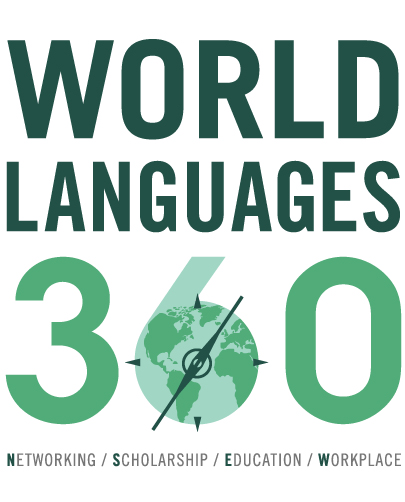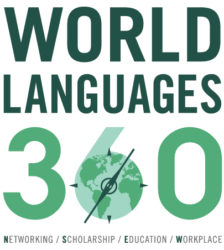We are thrilled to announce the recipients of our Mini Grant Pilot Program awards! Please join us in celebrating the following projects that are underway with the support of World Languages 360. All proposals met the program’s requirements, two of which are a clear alignment to at least one of our Compass Points and an agreement to publish, share, or present the findings in an educational publication or at a professional conference, or to share the resulting product or app. Below you will find excerpted and lightly edited portions of the successful proposals.
Integrating AI, Art, and History in Language Learning (Smith College)
This study will focus on the use of AI that can convert a text to a voice to demonstrate learners gains of the language abilities and knowledge. The AI tool the Micmonster, is a free tool and learners can access it easily. This study will present pedagogical implications and emerging themes in the future research of AI-based language learning methodology. The procedure will include giving authentic readings in Arabic to summaries. These readings will be based on a historical place, games, and other topics that have an influence in history. The student will create an art work similar to the selected reading. The main goals are to have students use the language in creative way and involve in a project as a team, and link their experience to real world situation. The students will remember this experience because they will create and plan. The teachers will learn from this experience and use it in their classes as a new approach in teaching language that involves different field of knowledge.
Expanding Horizons at MGA: Recruiting for a Strong Program (Middle Georgia State University)
We are planning a multi-faceted approach:
A. Identifying students who are doing well in our language classes and sending them an email (for online students) or a formal letter (for in-person students) letting them know how adding a language credential could benefit them and letting them know exactly how many classes they would have to take.
B. We also plan on finding key partners across campus, i.e. faculty, advisors, staff, ready to champion languages and our programs.
C. Host large recruitments events on our two main campuses (we have 5 campuses) in fall 2024 and spring 2025. We would like to have activities that can get students interested in the languages we offer:
• Activities/games focused on learning some basic words and phrases in French, Spanish, and Korean.
• Activities/games introducing students to the benefits of learning a second language for their careers and personal lives.
• Promotional material with our course offerings and degree options.
We would also work with our advising center so that a professional advisor can be present to register students for the language class they are interested in on the spot.
D. Finally, we would like to find a bilingual STEM speaker to host another event on what learning and knowing another language has done for their career.
Unleashing the Potential of ChatGPT in Curriculum Development and Lesson Planning (Foreign Service Institute, Global Language Center)
This project revolves around the role of ChatGPT 3.5 (free version) in the landscape of language education development. This project uncovers practical instances of leveraging ChatGPT 3.5 to craft comprehensive and effective lesson plans. The project explores the specific commands utilized during the research process, shedding light on the invaluable benefits derived from integrating ChatGPT 3.5 (free version) into the realms of curriculum and material development.
The project aims to illustrate insights through tangible examples across Farsi, Russian, Czech, and Slovak languages. This illustration delves into the steps undertaken to achieve results, underpinned by a discussion of the invaluable lessons gathered from this journey.
The primary objective is to share this enriching experience with a diverse audience, including educators, curriculum designers, and AI developers. The project findings not only stand to benefit ChatGPT users but also hold immense potential for language curricula and instructional practices thereby contributing significantly to the educators’ development community.
The Open Source Language Placement Project (Northeastern University)
The idea is to create an Open Source placement test for languages that is easily modifiable on a departmental level. There are many products out there that aren’t adjustable to different curriculums. Many also do not take into account dialectal variation, heritage learners, or multilingual repertoires that can often confound results. Also, instructors can often not see specific results and are left with having to do follow-up testing, which prevents the process from being transparent and efficient, when instructors already have so many other responsibilities. I want to create a meaningful type of placement that can be adapted to many languages and that works to fill in gaps that are currently present. Lastly, this placement exam should be able to communicate with university systems that oversee prerequisites (via API) to create an easy and responsible registration process.
Cross-linguistic Impact of iSpraak on Pronunciation Acquisition (Saint Louis University)
It has been noted in the literature that computer assisted pronunciation in general, and automatic speech recognition in particular, offer the most promise in enhancing learner speech (Golonka et al., 2014), and previous research we conducted (García et al., 2020) showed that iSpraak leads to specific types of pronunciation gains in second-semester Spanish students. The current research project extends previous work to new student populations by including third-semester Spanish students, and fourth-semester French students. Data collection began in January 2024 and will continue to May 2025.
Open Portal for Language Courses (Denison University)
Since costs of language books and the internet codes associated with them are so expensive, I am looking for ways to lower the economic burden for our students and, at the same time, give them a powerful tool to continue practicing Spanish outside the classroom. I am doing this to support open source books and affordable content for Spanish (and for other languages as well). My project consists of creating a website with a database with AI capabilities that provides students with assignments about different grammatical points. The artificial intelligence will give feedback and potentially grade those assignments based on specific rubrics. Moreover, this website will also contain a repository of assignments created by professors in the Department of Modern Languages with the help of AI agents. Additionally, this website will have a conversational chatbot in the target language with a text-to-speech functionality.
Come back soon for information on our next round of grant opportunities!

